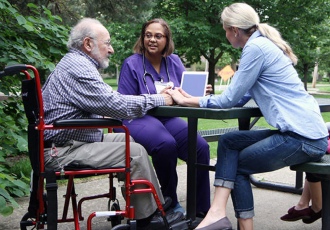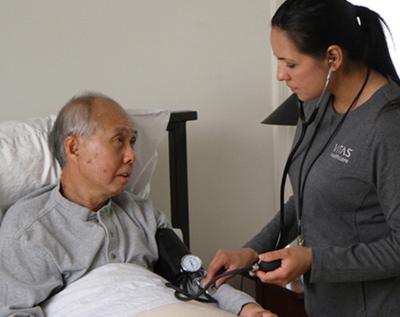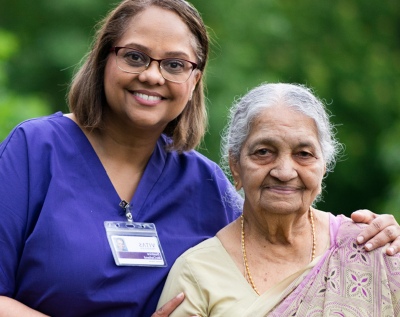Spirituality Matters: Finding Common Ground During Goals-of-Care Conversations
Matters of health are always central in goals-of-care conversations. But how might your patient’s religious beliefs affect their wishes for treatment?
I try to connect families with imams or chaplains to explain that palliative and hospice care do not infringe on their beliefs.-Munima Shaikh, MD, VITAS palliative care physician
The hospice discipline and care model acknowledge the significance of spirituality at the end of life: Every hospice care team features a chaplain and bereavement specialist to support patients and families through the complex questions, fears, and trials of faith that mark the journey toward death.
Still, patients may have misconceptions or concerns about hospice, perceptions that are rooted in their spiritual ideals.
Healthcare professionals helping patients to prepare for a transition from curative to comfort-focused care can reduce hospice hesitancy—and ensure patients’ end-of-life spiritual needs are known and met—by asking about religious beliefs, concerns, and preferences as part of a routine goals-of-care conversation.
Challenging Misunderstandings
Among both religious and secular hospice-eligible patients, lack of understanding about hospice services presents an obstacle to accepting care. A 2018 study found that 37% of polled respondents had misperceptions about hospice care and 53% had misperceptions about palliative care.
Common misunderstandings include the idea that hospice speeds up death, or that it aims to sedate patients to the point of unconsciousness.
In fact, research suggests that hospice can actually help dying patients live longer, more comfortable lives, with more opportunities to share meaningful experiences with loved ones. Hospice teams also embrace non-drug modalities for pain relief and comfort, including gentle massage, meditation, prayer, and virtual reality therapy.
To clear up this confusion, clinicians should ask patients questions about the source of their concerns. Once a mutual understanding is established, clinicians can educate in terms that everyone can grasp.
Embracing Education
“Most patients’ family members are receptive to education. If you sit down and talk about why you use pain medication [for instance], most people are receptive,” says Munima Shaikh, MD, a palliative care physician for VITAS in Orlando, Florida.
As a Muslim, she’s proud to help other followers of Islam understand how hospice fits into the teachings of their religion—some interpretations of which suggest that pain near death serves to purify the soul before it reaches the afterlife.
For more complex spiritual questions, Dr. Shaikh gladly reaches out to specialists on her team and members of the community.
“I try to connect families with imams or chaplains to explain that palliative and hospice care do not infringe on their beliefs,” she says.
‘He Was Trying, and That Matters’
Sometimes, religious patients’ concerns about hospice stem from uncertainty about a provider’s ability to meet their specific spiritual needs, says Sunil Pandya, MD, associate medical director in Collier County, Florida.
“It’s not that Muslims, or in my case Hindus, believe that dying with dignity is bad. It’s that we don’t know if hospice knows what we want,” he says. “Do they know about my father’s vegetarian diet? About facing a Muslim’s bed the right way? Do they know the right prayers to say and when to say them?”
Dr. Pandya says that in these cases, a little compassion and effort can go a long way toward helping a patient and family feel more accepted by their care team, and more satisfied with the care they receive.
For him, this concept is personal: his father was a VITAS patient.
“My friend Tom was a chaplain at VITAS,” Dr. Pandya explains. “Although Tom was a Christian, he came into my dad’s room and read Vedic Hindu prayers in English to my dad, and that really meant a lot. He was trying, and that matters.”
Healthcare professionals whose patients follow an unfamiliar religion may naturally fear saying or doing the wrong thing at the wrong time. Most clinicians want to go above and beyond to support their patients—but without crossing unspoken boundaries.
As Dr. Pandya points out, trying your best to meet a patient’s spiritual needs demonstrates a level of commitment and compassion that both the patient and their family are likely to notice and appreciate.
Treating Patients as Individuals
Many cultural notions about death and dying are rooted in religion. Even nonreligious patients and families may hold some spiritual ideas about dying, death, or the rituals that follow it.
Prior to a goals-of-care discussion, clinicians can prepare for common questions and concerns by studying popular ideas about death from religious and secular thinkers.
Of course, every patient and family—no matter how religious or what tradition they follow—will have their own unique take on religious ideas.
In Buddhism and Hinduism, for example, suffering is considered an accepted part of life, and believers may expect to be stoic when facing its challenges, including illness and death. People from parts of the world where these traditions are common may share that view of suffering, even if they are not believers themselves.
Clinicians should be adaptable and accountable: Ask directly about a patient’s approach to religion to avoid awkwardness or miscommunication, and if you make a mistake, simply apologize, and commit to doing better.
Related: More Tips for Providing Culturally Sensitive Care >
Take the time to ask yourself: Do you really engage with the patients and families, or do you just make assumptions?
Healthcare professionals often think that they just need to bring in someone that speaks the patient’s language—but do you really know what they need or want on a personal level?
Having the Conversation
Advance care planning/goals-of-care discussions are ideal opportunities to build trust, overcome concerns, and develop a roadmap for a patient’s care that satisfies their unique needs and preferences.
Make your next conversation count with guidance from VITAS, the nation’s leading provider of end-of-life care. Download our Guide to Goals-of-Care Discussions today >
Upcoming Webinars for Healthcare Professionals

Tips for Effective Goals-of-Care Discussions
Conduct more effective goals-of-care discussions with your patients by using this conversation starter guide.
Download Now Clinicians: Receive Our Newsletters
